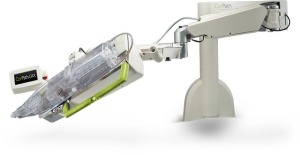by
Lauren Dubinsky, Senior Reporter | December 18, 2017
Apex Heart Institute of India recently installed Corindus Vascular Robotics’ CorPath GRX System to train its interventional cardiologists on robotic-assisted percutaneous coronary interventions.
This was the first commercial installation of the system outside of the U.S.
"We are excited about the burgeoning worldwide robotics market, and we are seeing a growing interest in international markets," Mark Toland, president and CEO of Corindus, told HCB News. "Our current focus areas include India, Japan, China, and selected European countries."



Ad Statistics
Times Displayed: 60894
Times Visited: 1960 Ampronix, a Top Master Distributor for Sony Medical, provides Sales, Service & Exchanges for Sony Surgical Displays, Printers, & More. Rely on Us for Expert Support Tailored to Your Needs. Email info@ampronix.com or Call 949-273-8000 for Premier Pricing.
The hospital’s first complete robotic procedure was performed via left dorsal transradial access. These types of procedures have been shown to reduce incidences of major bleeding and vascular complications.
Dr. Tejas Patel, chairman and chief interventional cardiologist at the institute, is the pioneer of this transradial access technique and has taught it to over 5,000 physicians to date. He reported that he was “very impressed” by CorPath GRX’s capabilities in complex procedures and the level of precision he was able to deliver.
Within the first three days of operating the system, Patel and his team successfully performed 11 PCI procedures.
CorPath GRX, which scored
FDA clearance in October 2016, is Corindus’ second-generation CorPath Vascular Robotics System. It features upgrades that improve its precision and workflow and allow it to be used for a wider range of procedures.
In February, NewYork-Presbyterian Hospital, UC San Diego Health and the University of Virginia Health Systems
performed the first commercial procedures using the system. Each provided positive feedback on their initial experience with it.
“I am impressed with the additional capabilities of the new GRX System,” Dr. Ehtisham Mahmud, division chief of cardiovascular medicine at UC San Diego Health, said at the time. “The redesigned bedside unit, intuitive control console, and especially guide catheter control further facilitate complex PCI procedures.”
The first installation of CorPath GRX
for investigational use outside the U.S. was at Fu Wai Hospital in China. In March, a robotic-assisted PCI procedure was transmitted live from the hospital to more than 8,000 attendees at the China Interventional Therapeutics Conference.
"Robotic-assisted intervention improves precision, allowing for more accurate stent positioning, can reduce radiation exposure to both physicians and patients, and future generations of the technology may have the potential to improve global access to care through remote capabilities," said Toland.
Back to HCB News

